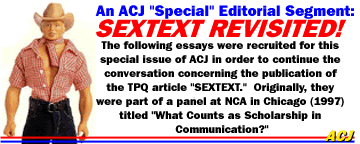
|

|
|
|
Stephanie
J. Coopman
San Jose
State University
Joy
Hart
University
of Louisville
James
G. Hougland, Jr. &
Dwight
B. Billings
University
of Kentucky
ABSTRACT: This essay examines the functions of stories in the talks given by church leaders in two Southern Appalachian denominations, Church of God, Cleveland, Tennessee and Southern Baptist, in the 1950's. Speakers used stories primarily to manage meaning, thereby shaping the organizational realities of church members. Although there were few differences between the two denominations in the functions of stories, there were differences related to leaders' status. Ministers and lay leaders told the same number of stories; however, ministers told more stories concerned with managing meaning and lay leaders told more stories designed to reduce listener uncertainty. The implications of these findings are discussed.
Nathaniel
Kohn
University
of Georgia
ABSTRACT: Informed by such post-colonial theorists as Homi Bhahba, Trinh Minh-ha, and Rey Chow, this auto-ethnographic narrative explores celebrity and its pursuit as a liminal space where historical power relationships might be discarded in favor of new potentialities. Minimalist, personal, emotional, dialogic and biographically specific, it is written as a telephone conversation in which memory, technology, theory, and desire intrude.
![]()
![]()
Le Plaisir C'est Dans le Texte!
David
Sutton
Auburn
University
Story
and More:
Virtual
Narratives for Electronic Times
John
Nelson
University
of Iowa
Anna
Lorien Nelson
Michigan
State University
Navigating
the 'Net with the Narrative Paradigm:
So What?
Ann
Rosenthal
Columbus
State University
![]()
 |
Robert
T. Craig
University
of Colorado, Boulder
The Ways and Means
of Knowing:
The "Problem" of Scholarship in a Postmodern
World
Ted
A. Wendt
Murray
State University
Paul
H. Gray
University
of Texas
Malcolm
R. Parks
University
of Washington
What Counts as
Scholarship in Communication?
An Autoethnographic Response
Carolyn
Ellis
University
of South Florida
![]()